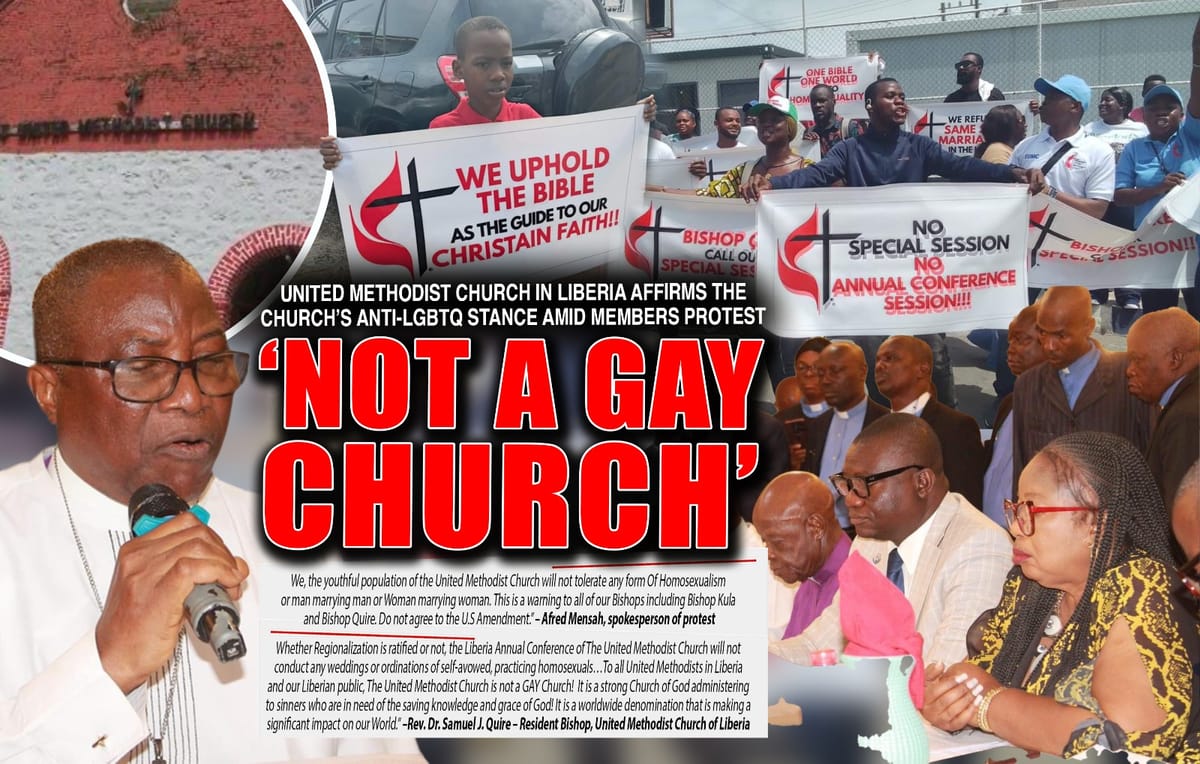United Methodist Church in Liberia Clarifies Its Stance on LGBTQ Issues Amid Protests - FrontPageAfrica

Source: Front Page Africa
Author: Jaheim T. Tumu
MONROVIA - The United Methodist Church in Liberia has clarified its position on homosexuality, emphasizing that the church will not conduct any weddings or ordinations of self-avowed and practicing lesbian, gay, bisexual, transgender, and queer (LGBTQ) individuals in Liberia. This statement come amid protests from some church members expressing concerns over the church's stance on LGBTQ matters.
By Jaheim T. Tumu, [email protected]
On Friday, June 7, members of the United Methodist Church, primarily youth, staged a protest at the Trowen Nagbe Church in Sinkor, demanding clarity on the church's position on same-sex marriage, a practice prohibited by the denomination in Liberia since its inception. The protesters were heard singing, "You can have your gay rights but give us the Church. No turning back, no turning back."
The spokesperson for the protesters, Alfred Mensah, said the youth in the church will not condone homosexuality, particularly the idea of same-sex marriages. He expressed disappointment over the concept of regionalization, referencing an alleged portion of Bishop Samuel Quire's communication, which suggested that regionalization would enable the ministry to cater to the unique contexts and needs of different geographical regions without losing a shared identity and purpose.
Mensah said, "Where is our shared identity and purpose? God made us man and woman. In this particular church, God says that man will leave their mother and father's house and go for a woman. We must uphold this. The Bishop's message did not settle well with us."
He further emphasized that the Bishop indicated that the transition holds new promise and opportunity to follow Jesus in their own context. "In our context, the way we do God's business here is not the way people do God's business in America. So, the regionalization is something we blatantly denied throughout our conference," he added.
Recognizing homosexuality
The United Methodist Church's General Conference, held in Charlotte, North Carolina, from April 23 to May 3, 2024, acted to remove language from the Book of Discipline that restricted or singled out non-heterosexual people for disparate treatment. Delegates voted 692-51 to repeal the church's longstanding ban on LGBTQ clergy, marking a significant shift in church policy.
This decision come after the United Methodist denomination, previously the third largest in the United States, experienced a historic split as about one-quarter of U.S. congregations left between 2019 and 2023, mostly conservative churches dismayed by the denomination's lack of enforcement of its longstanding LGBTQ bans. With the absence of many conservative delegates, progressive delegates have moved quickly to reverse such policies, potentially prompting departures of some international churches, particularly in Africa, where conservative sexual values prevail, and same-sex activity is criminalized in some countries.
Committed to Traditional Christian Teaching
In Liberia, the head of the United Methodist Church is Bishop Samuel Quire. Addressing concerns and misconceptions about the church in Liberia's stance on LGBTQ issues, Bishop Quire reaffirmed the church's commitment to traditional Christian teachings on homosexuality.
"Whether regionalization is ratified or not, the Liberia Annual Conference of The United Methodist Church will not conduct any weddings or ordinations of self-avowed, practicing homosexuals," said Bishop Quire.
"To all United Methodists in Liberia and our Liberian public, the United Methodist Church is not a GAY Church! It is a strong Church of God ministering to sinners who need the saving knowledge and grace of God! It is a worldwide denomination making a significant impact on our world."
One of the three decisions reached at the General Conference meeting in Charlotte was regionalization, which seeks to amend the church's structure to be less American-centric. Regionalization empowers churches and annual conferences worldwide to make ministry and missional decisions appropriate for their context to be more relevant and effective. Bishop Quire noted that since the contextual realities of Africa differ from those of America, Europe, and Asia, African conferences will decide what is needed to advance the disciple-making mission of the United Methodist Church in Africa.
Bishop Quire emphasized that regionalization will enable the United Methodist Church in Liberia to focus on its mission of making disciples of Jesus Christ for the transformation of the world, avoiding distractions from debates over identity. He indicated that it would be used as a vehicle to make and enforce relevant policies to guide and direct its missional priorities moving forward.
He stated that regionalization, which amends the church's constitution, must be ratified by the annual conferences before going into effect. The "Liberia Annual Conference of the United Methodist Church is traditional in its interpretation of Holy Scripture and will continue to do evangelistic outreach to all persons who live in darkness and do not know the redemptive grace of our Lord, Jesus Christ," he said.
Bishop Quire further emphasized the commitment to extend scriptural holiness to all persons through the grace of God, noting that the church in Liberia will continue to abide by the summons of Jesus Christ. He called for conversations with the executive committee of the Liberia Episcopal Area to share the 2024 vision, cautioning clergy and laypersons of the Liberia Annual Conference to refrain from undermining the ministry. He stated, "Undermining the ministry of the Church or the ministry of other clergy is a chargeable offense that will be enforced to maintain the order of the Church."
Regarding the regionalization, Bishop Quire said the modality for its ratification will be put into place in the next six months, with further conversations, consultations, and awareness throughout the Liberia Episcopal Area. Once the plan is ratified across all annual conferences worldwide, the Council of Bishops will announce the results, and the plan will go into effect.



